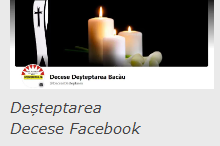Choral music, the master key to human sensibility and a source of comfort in troubled times, has been dwelling in the souls of many Bacau locals for at least one century now, as proves the existence of two landmark choirs of the county: the ‘Athenaeum’ Choir of the Bacau municipality and the Peasant Choir of the Oituz commune.
Although the number of choruses has decreased dramatically from the 150 that used to perform in the ?80s in the County of Bacau, an enthusiast of this genre, Professor Vintila Dabija, argues that the need for choral music is still out there, and that, in addition to the aforementioned formations, the “Armonia” student choir of the “George Apostu” National College of Arts of Bacau enjoys particular success in the country and abroad.
“Choral music conveys an extraordinary message, primarily through the harmony created among the voices and through the bond between the spectator and artist, through that state of wellbeing and comfort given by the beautiful sonority. Then, most importantly, it fosters communication between people with different levels of culture, whose sole purpose is to transpose into the ether the wonderful essence of the score. But the choir also shapes characters, reinforces human solidarity. This is about cohabitation within a group, communication, about fine-polishing behaviors and culture,” says in turn Professor Gheorghe Gozar from the “George Apostu” National College of Arts.
The “Athenaeum” Choir started in 1923 as a musical ensemble of the Bacau primary school teachers. After 1949, the choir functioned under the aegis of either the Education Inspectorate, or of the Education Trade Union.
“Currently it has an independent status, as the ‘Athenaeum’ Choral Society and, although it still belongs to the teachers, it no longer acts under the wing of the County School Inspectorate or of the union. Yet, in order to preserve tradition and stay true to form, we keep in its title the formula ‘teachers’ choir’,” says Professor Ion Banica, the ensemble’s current conductor, who turned 81 last month.
This choir was ?fathered’ by Ion Luca, a priest, poet, playwright, but also a reputed musician. Moreover, Ion Luca was the first conductor of the “Athenaeum” Choir, leading the body of singers until 1932. Then the baton was taken by Professor Alexandru Tiron, a former choir member who led the singers until 1941, and after the war Vasile Parlea conducted it for 15 years. Next to lead the choir was Professor George Vranceanu, and since 1971 Professor Ion Banica has taken the podium.
He says that the secret to the longevity of the “Athenaeum” Choir were passion, dedication and love for choral music, as well as the power to overcome hardships.
The first public recognition of the value of the Bacau vocal ensemble came rather late, in 1972, at the National Contest of Chamber Choirs held in Brasov, where 48 ensembles competed and where the “Athenaeum” took the “Gheorghe Dima” Trophy and the Gold Medal awarded by a jury made up of personalities of the trade like Marin Constantin — conductor of the legendary Madrigal Choir, composer Dumitru Botez and other reputed specialists of Romanian choral music.
There followed other commendable participations in festivals organised in Bacau, Botosani, Suceava, Iasi, Buzau, and in 1983 the “Athenaeum” was invited to perform on the stage of the Romanian Athenaeum in Bucharest.
“It was a great success, and this is the moment when the international career of the ensemble started, sprinkled with tours and prizes, international festivals in Czechoslovakia, Poland, Italy, France, Germany, Austria, Greece or Switzerland,” remembers Gheorghe Gozar, who has been a member of the “Athenaeum” Choir for over 20 years.
In 1983, the “Athenaeum” recorded its first Electrecord LP and in 2001 the choir took to recording two CDs; in 2007 it delivered a vocal-symphonic concert where the pičce de resistance was Vivaldi’s “Gloria”, with maestro Ovidiu Balan at the orchestra lectern.
Since 2003, the lack of financing rendered the “Athenaeum” Choir unable to honor invitations to domestic, but mainly international festivals and competitions.
“We received every year 10-15 such invitations, coming from countries where we have performed, but also from Spain, the Netherlands and Italy. Our last concert was in France in 2003, where to our great joy, we won the first prize,” says Professor Banica.
After 1990, many choirs throughout the country, some very valuable, were disbanded for financial reasons, because the trading companies that supported the musical ensembles disappeared. The choirs funded by trade unions or the Culture Centres did not resist either, and the interest in choral performances also dimmed out.
“Some hard times followed for us too. There are only two known choruses left in the entire region of Moldavia, besides the county of Bacau, one is the choir of the Iasi Conservatory, the other is the Opera choir. That’s all. The ‘Athenaeum’ Choir acts in lieu of a Philharmonic Choir of Bacau and this thanks to maestro Ovidiu Balan, who is responsible for the existence of the Bacau symphonic orchestra, but also for the continuation of the activity of our choir. A great man, a friend of ours. We fought together, he for the Philharmonic, I for the chorus, to resist time. We were stalwart to keep this choir of the teachers into being, for the memory of our forerunners — the wonderful teachers who stood in the ranks of the Bacau choir, who brought to the ‘Athenaeum’ their passion for music, but also the joy of being together, convey to the public a bit of the sparkle of these jewels of choral music, of the wonderful experience it offers,” confesses Professor Ion Banica. In fact, in 2014 there are 91 years since the founding of the choral society he has been heading for nearly 43 years now.
Over the years, the formation’s repertoire has included difficult scores from the symphonic universal creations, including famous works by Mozart, Beethoven, Vivaldi, Strauss, Verdi, but also Romanian choral songs of folk inspiration. The “Athenaeum” performed in concerts with famous opera singers from Romania, France, Italy and the Republic of Moldova.
“I am impressed at what the ‘Athenaeum’ choral has done in time. I am sure that Professor Banica, but also the choir members, make efforts to further resist. A revival of choral music could be sensed in the last years, especially around churches. Now, when choral music is freed of political tutelage, its charm and virtues must reach the people just as the ‘Athenaeum’ attempts to do. And nothing they do is superfluous,” says musicologist and composer Liviu Danceanu, conductor of the ‘Arhaeus’ Choir.
The Oituz Peasant Choir was established in 1903 as a church and people’s choir by priest and PhD student Ion Tudorache, grandfather of great actress Olga Tudorache, with the support of Miss Elena Negropontes, the future wife of General Eremia Grigorescu. After several years, the choir was directed by Valeriu Tudorache, the son of its initiator, and after his early death, it was conducted for 17 years by teacher Constantin Radu. Since 1964 it sings under the baton of Professor Gheorghe Oprea.
“It’s 50 years now since I have been directing, organizing, permanently promoting youth and preparing the choir every day. Everything for keeping it alive, for it to live up to the height of those who have set it up and led it into a century-long activity,” says Professor Gheorghe Oprea.
An old photo of 1913, showing the radiant faces of the choir members dressed in national local-specific costumes, is displayed in a visible place in the Cultural Center of Oituz, the venue for the performances of this peasant chorus of legendary fame for the locals.
“These are the forerunners of the chorus that continued activity, they have been present in the spirituality of the community, of the county and the country, since 110 years. I haven’t met the choir members pictured in this photo, nor the founders of the choir. Yet their grandchildren and grand-grandchildren, the current members of the Oituz peasant choir, them I know well. I have been at their side for more than 30 years,” says Oituz mayor Ion Osolos with his baritone voice, himself a reliable member of the ensemble since the time he was a lad.
Nowadays too, most choir singers are farmers, many of them elderly. There are also entire families who have been singing with the ensemble for many years, like husband and wife Aluiz and Maria Balint and their son, Marcel, but also another family: Cornel — a great tenor, his son Eugen — who boasts a clear bass voice. The couples Aglaia and Vasile Lazar, Aglaia and Ion Todirita should also be mentioned.
In the 110 years of the formation’s activity, more than one thousand locals have sung in the choir, have performed in hundreds of shows, and come to evening rehearsals at the Cultural Center, ensuring the longevity of the choir, that joins together Orthodox and Catholic faithful.
“There is also the patriotic aspect. For dozens of years we have participated in all events organized by the community for the anniversary or commemoration of the fierce battles given at Oituz and Poiana Sarata, in the world conflagrations of the previous century. The event closest to our hearts is ‘The Memory of Oituz’, which has been held every year on August 15 since 1973. Oituz-born guests come to attend from all corners of the country, but also from abroad. It’s beautiful and uplifting to perform for them, sing on stage in your native village in front of young and old, to sing the songs that have strengthened the people’s souls in dramatic moments, or songs that reflect the creative spirit of the locals,” said Professor Gheorghe Oprea.
Attending one year the celebrations in Oituz, Roman Catholic Bishop of Iasi Petru Gherghel said that “gratitude should be expressed to those who have toiled over the years to maintain this ensemble, to those who have sung in the choir.”
Bishop Petru Gherghel also revealed that he “holds particularly high” what the Oituz peasant-choir singers are doing “to promote traditional cultural values, as well as for their long-lasting praise to God and ode to the past of this area and the community they live in.”
“The biggest success is that the choir has always been present in the spirituality of the commune, if we get to speak about the cultural activity of Oituz, rich in folklore tradition, and the choir has always been a landmark in this respect,” mayor Ion Osolos adds in too.
The Oituz peasant choir has also drawn recognition in the country, being invited at almost all choral events organized in various areas, and returning with medals and diplomas; it also performed on the television and radio, where it recorded the anthem of Oituz — “Ancient Hearth.”
“Few communes have an anthem of their own. Whatever event we would attend, our performance begins with the Anthem of Oituz,” says choir member Veronica Covaci.
In a remarkable way, the love for choral music is continued by the “Armonia” Choir that brings together students of the “George Apostu” National College of Arts in Bacau.
In the 24 years since its founding, the 40 members of this dynamic formation that changes its structure every year, recorded songs performed in the company of professional symphonic formations, the Bacau Symphony Orchestra, soloists of the National Opera, but also with orchestras from Brasov and Satu Mare.
The “Armonia” Choir also accompanied renowned singer and songwriter Tudor Gheorghe on his ‘Seasons’ tour. Older choir line-ups performed in concerts in France, Ukraine, Poland, Hungary, Italy; the choir was honored with awards and special commendations, including the Popularity Award at the renowned European choir festival “May Inflorescence” hosted by the French city of Tours.
Yet another remarkable feat is the presentation last year in Vienna, in a world premiere, of the “Symphonia Romani’, a composition by 27-year old Adrian Gaspar, who was born in Timisoara and now lives in Vienna.
“This show, initiated by maestro Teodor Coresi, was particularly special, not only because it is a novelty for music lovers, but because it was presented in a sensitive social and political context where Roma ethnics do not enjoy a favorable image in Europe, and many of this community are being expelled from various countries of the continent. The subject of this vocal-symphonic creation is the reflection, through the feelings of a Roma child who has been a prisoner in Auschwitz, of one of the deep tragedies endured by the members of this ethnic group. The performance of the Bacau teens received a standing ovation. I was aware, from previous collaborations, of the value of the ensemble led by Professor Gheorghe Gozar, but what they did to confer deepness to the Symphonia Romani is just amazing for such young voices. The score is very difficult to sing, there are bars that require profound knowledge of vocal technique, a deep living of music. Well, they were able to render all that, even on a stage in the homeland of music, Austria,” says conductor of the show Ovidiu Balan, honorary director of the Bacau Philharmonic.
Created at a time when the choral movement in Romania had entered a certain decline, the ‘Armonia’ Choir, conceived at first as an equal-voice ensemble that turned into a mixed choir in 1996,” resisted through love and tenacity,” said its initiator and conductor, Professor Gheorghe Gozar.
“Every year, a class leaves College and we have to rebuild the composition of the choir. It’s a ‘perpetuum mobile’. It’s a tremendous work to attain high performance, and our choir has reached that peak. It has won the National Contest three times, we are present almost every year at festivals and international competitions,” said the conductor.
In the eighth and ninth decade of the last century, Gheorghe Gozar had succeeded in creating a valuable workers’ choir, with over one hundred members from MRO specialist and aerospace parts manufacturer Aerostar Bacau; this body of singers had reached the performance of playing Beethoven’s Ninth Symphony with the Philharmonic and soloists of the National Opera.
The same professor now guides the Orthodox Seminary Choir of Roman, the choir of the “St. Nicholas” Church and the Bacau Pensioners Choir, that has many of his former Aerostar singers in its ranks. AGERPRES













